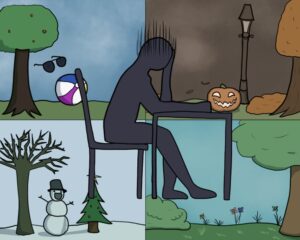
Autumn’s changing leaves and winter’s fresh snow may appeal to some, but others have difficulty waking up in the morning, are fatigued during the day, and are generally depressed as this time of year is upon us.
You might know this as seasonal affective disorder, or SAD, a type of depression associated with the changing seasons. When the temperatures drop and days shorten, onset appears in late fall and early winter and can last into spring.
Xavette Allen, a public relations sophomore at Florida A&M University from Broward County, adjusts to the season by changing her outlook on everything.
“I feel like the seasons have an emotional toll on me but reevaluating how I move in correspondence to how I feel, keeps me balanced,” Allen said.
To maintain good spirits, she reminds herself of her why she is in college to keep her motivated.
“I reward myself for completing the small stuff, and it makes the process a lot more manageable,” Allen said. “In the fall, it’s hot some days and raining others, and I may not feel like doing anything. Then I’m behind and everything’s going downhill, which is why I try to stay afloat by giving myself a little extra support. Especially since no one knows what it feels like to be in your shoes more than you do.”
Although seasonal depression makes it difficult to motivate yourself to make changes, there are plenty of ways you can help yourself feel better.
Mathieu Coqmard, a graduate student in architecture at FAMU, keeps himself in good spirits by either working out or watching a movie.
“I also take myself to Cascades [Park] to relax while working out,” Coqmard said. “Certain weeks of this past year I tended to not want to go out or do much that wasn’t exactly it, but certain days.”
Kayla Jones transferred to FAMU last year from Southern University and tries to get as much sunlight as possible to heighten her
mood.
“Being away from family makes it even worse for me to focus on this time,” Jones said. “My friends have assisted a lot with checking in with me on a regular around this time.”
Jones goes to the gym to shift her negative thoughts to positive actions.
According to Mental Health America, “Seasonal depression has a predictable pattern of recurrence, preventative measures may help to reduce symptoms. Some forms of prevention that can help include beginning light therapy in the early fall before the onset of symptoms, exercising more, increasing the amount of light at home, meditation and other stress management techniques, spending more time outside, and visiting climates that have more sun.”
Whenever the winter blues are severe enough, try to plan sunny vacations in the middle of the season. You can do this to rejuvenate your body and your mind, giving your energy levels a boost.